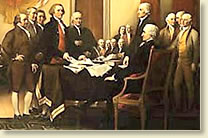 On June 28th, 1776 Thomas Jefferson presented his Declaration of Independence to the Continental Congress after weeks of writing and revisions and editing by the five member committee that included Benjamin Franklin, John Adams, Roger Sherman, and Robert Livingston. It was not the first or the last time leaders felt the need to put pen to paper and establish the need to declare the rights of mankind.
On June 28th, 1776 Thomas Jefferson presented his Declaration of Independence to the Continental Congress after weeks of writing and revisions and editing by the five member committee that included Benjamin Franklin, John Adams, Roger Sherman, and Robert Livingston. It was not the first or the last time leaders felt the need to put pen to paper and establish the need to declare the rights of mankind.1690 - John Locke's Second Treatise on Government:
All mankind... being all equal and independent, no one ought to harm another in his life, health, liberty or possessions.
Read more at http://www.brainyquote.com/quotes/authors/j/john_locke.html#tdmePvf8rY0ols70.99
“The
state of nature has a law of nature to govern it, which obliges every one; and
reason, which is that law, teaches all mankind who will but consult it, that,
being all equal and independent, no one ought to harm another in his life,
health, liberty, or possessions."Read more at http://www.brainyquote.com/quotes/authors/j/john_locke.html#tdmePvf8rY0ols70.99
All mankind... being all equal and independent, no one ought to harm another in his life, health, liberty or possessions.
Read more at http://www.brainyquote.com/quotes/authors/j/john_locke.html#tdmePvf8rY0ols70.99
Read more at http://www.brainyquote.com/quotes/authors/j/john_locke.html#tdmePvf8rY0ols70.99
All mankind... being all equal and independent, no one ought to harm another in his life, health, liberty or possessions.
Read more at http://www.brainyquote.com/quotes/authors/j/john_locke.html#tdmePvf8rY0ols70.99
June 1776 - George Mason's Virginia Declaration of RightsRead more at http://www.brainyquote.com/quotes/authors/j/john_locke.html#tdmePvf8rY0ols70.99
THAT all men are by nature equally free and independent, and have certain inherent rights, of which, when they enter into a state of society, they cannot, by any compact, deprive or divest their posterity; namely, the enjoyment of life and liberty, with the means of acquiring and possessing property, and pursuing and obtaining happiness and safety.
All mankind... being all equal and independent, no one ought to harm another in his life, health, liberty or possessions.
Read more at http://www.brainyquote.com/quotes/authors/j/john_locke.html#tdmePvf8rY0ols70.99
July 1776 - Thomas Jefferson's Declaration of Independence: Read more at http://www.brainyquote.com/quotes/authors/j/john_locke.html#tdmePvf8rY0ols70.99
We hold these truths to be self-evident, that all men are created equal, that they are endowed by their Creator with certain unalienable Rights, that among these are Life, Liberty and the pursuit of Happiness.
1793 - Article 2 of the French Declaration of the Rights of Man and Citizen:
The aim of all political association is the preservation of the natural and imprescriptible rights of man. These rights are liberty, property, security, and resistance to oppression.
1876 - Declaration of the Rights of Women (National Women Suffrage Association)
We ask of our rulers, at this hour, no special favors, no special privileges, no special legislation. We ask justice, we ask equality, we ask that all the civil and political rights that belong to citizens of the United States, be guaranteed to us and our daughters forever.
1948 - Articles 1 & 3 of the UN's Universal Declaration of Human Rights:
All human beings are born free and equal in dignity and rights.They are endowed with reason and conscience and should act towards one another in a spirit of brotherhood.
Everyone has the right to life, liberty and security of person.
